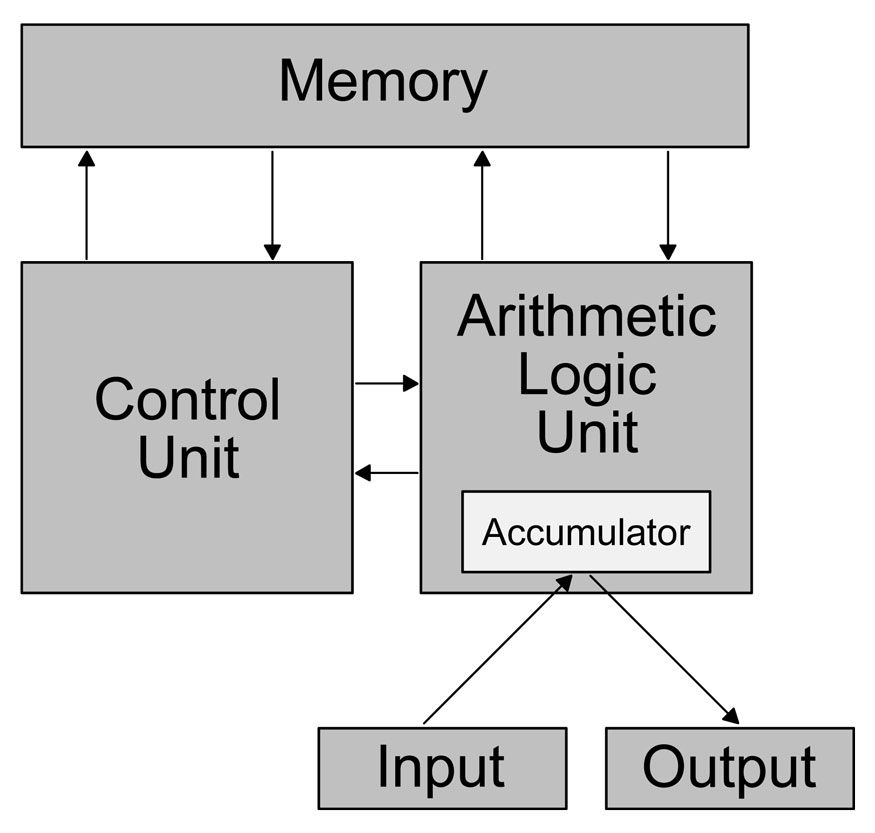CPU: Central Processing Unit

The full form of CPU is “Central Processing Unit“. CPU is also called as processor, central processor, main processor or microprocessor. CPU is also known as the brain of the computer. The central processing unit (CPU), is the unit that performs most of the processing inside a computer. To control the flow of instructions and data to and from other parts of the computer, the CPU relies heavily on a chipset, which is a group of microchips located on the motherboard.
Traditionally the term CPU refers to a processor consisting of a control unit and an arithmetic logic unit.
Central Processing Unit (CPU) = Arithmetical Logical Unit (ALU) + Control Unit (CU)
Components of CPU
The CPU is broadly divided into three main parts.

Arithmetical Logical Unit (ALU)
It is a significant part of the CPU. It is responsible for the supervision of all numerical and logical functions, such as subtraction, addition, division, multiplication etc.
Control Unit (CU)
CU is the main component of the CPU. It directs a task to the whole system, and it regulates all the computer activities that occur.
Memory or Register
A register is a particular type of device for memory. The memory stores the information which the processor has to process or already processed.
History
Some important events related to CPU history are as follows:
| Year | Event |
|---|---|
| 1823 | Baron Jons Jackob Berzelius discovered silicon (Si), which is the processor today |
| 1903 | Nikola Tesla patents electrical logic circuits (gates or switches). |
| 1947 | John Bardeen, Walter Brattain and William Shockley invented the first transistor at Bell Laboratories. |
| 1958 | Robert Noyce and Jack Kilby developed the first integrated circuit. |
| 1971 | Intel introduced the first microprocessor, the Intel 4004. |
| 1991 | AMD introduced the AM386 microprocessor family. |
| 1993 | Intel released the Pentium processor. The processor was a 60 MHz processor, contains 3.1 million transistors and sells for $878.00. |
| 2000 | Intel released the Celeron 533MHz with a 66MHz bus processor. |
| 2006 | Intel released the Core 2 Duo processor E6320 (4 M cache, 1.86 GHz, 1066 MHz FSB). |
| 2008 | Intel introduced the first Core i7 desktop processors (i7-920, the i7-940, and the i7-965 Extreme Edition). |
| 2010 | Intel launched the first Core i5 mobile processors (i5-430M and i5-520E). |
| 2017 | Intel released the first Core i9 desktop processor, the i9-7900X, in June 2017. It uses the LGA 2066 socket, runs at 3.3 GHz, has 10 cores, and 13.75 MB of L3 cache. |
| 2018 | Intel introduced the first Core i9 mobile processor, the i9-8950HK. It uses the BGA 1440 socket, runs at 2.9 GHz, has six cores, and features 12 MB L3 cache. |
Other full forms of CPU
| Full Form | Category |
|---|---|
| China Pharmaceutical University | Universities & Institutions |
| Contract Postal Unit | Regional Organizations |
| Critical Patch Update | Security |
| Central Philippine University | Universities & Institutions |
| Central Policy Unit | Departments & Agencies |
| Central Police University | Police |
| Clark Public Utilities | Firms & Organizations |
| Commonwealth Press Union | Trade Associations |
| Communist Party of Ukraine | Politics |
| Computer Professionals’ Union | Technological Organizations |
| Cururupu Airport | Airport Codes |
| Columbia Pacific University | Universities & Institutions |
| Central Processing Unit | Hardware |
| Cost Per Unit | General Business |
| CompUSA, Inc. | NYSE Symbols |
| Constructing Physics Understanding | Educational |
| Ceramic Public Urinal | Products |
| Core Processing Unit | Hardware |
| Computer Parts Unlimited | Stock Exchange |
| Command Processing Unit | Military |
| Custom Processing Unit | News & Media |
| Cute People United | Chat |
| Clever People Understand | Chat |
| Chemical Protective Underwear | Military |
| Corporate Protection Unit | General Business |
| Centrifugal Power User | Occupation & Positions |
| Capacitance Potential Units | Unit Measures |
| Control Pointing Unit | NASA |
| Control Program Unit | General |
| Common Part User | Military |
| Computing Processing Unit | Computing |
| A Control And Production Unit | General |
| A Central Patrolling Unit | General Computing |
| Computer Put To Use | Computing |
| Chips Processing Unit | General |
| Computer Power User | Computing |